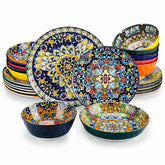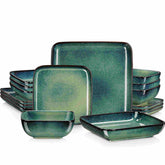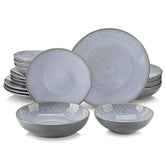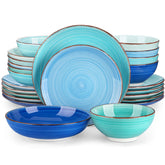Cleaning and Sanitizing Your Stoneware Plates Set: Best Practices for Maintaining Hygiene
Navigation
- Basic Cleaning Techniques
- Deep Cleaning Methods
- Sanitizing Stoneware Plates With Hot Water and Steam
- Dishwasher Use
- Storing Stoneware Properly
- Conclusion
With their high durability, unique aesthetics, and the warmth they bring to any dining setting, stoneware plates have become a popular pick for many kitchen enthusiasts. However, it gets tricky to maintain the quality and hygiene of your stoneware plate set, where a quick rinse after meals won't cut it.
You will need to properly clean and sanitize your stoneware plates to preserve the beauty of these plates while ensuring they live a long life. In today's post, we'll guide you on how you can clean and maintain your stoneware dinnerware to keep it looking like new for years to come. So stay along!
Basic Cleaning Techniques
Like any piece of cookware, It's essential to determine the proper cleaning care for your stoneware immediately. So, without further ado, let's take a look at some basic cleaning techniques for stoneware plates.
Daily Cleaning
Whenever you use your dinnerware, you have to clean it-it goes without saying. So, if you're cleaning your stoneware plates daily, make sure you're doing it right. You can hand wash your plates but don't use anything other than a non-abrasive sponge to avoid scratches. However, you can use a mild liquid dish detergent and a metal cleaner to remove scratches from metal knives and forks.
While cleaning your stoneware plates, place a plastic dishwashing container in the sink and fill it about halfway with lukewarm water. It will help cushion the dishes and prevent any damage as you wash them. However, make sure to avoid overloading the container and instead wash only one to two plates at a time.
Moreover, apart from a soft sponge, you can also use a delicate cleaning tool, such as a dishcloth or a soft-bristled brush. You can also keep a separate container in the sink for rinsing off your stoneware plates in lukewarm water. Once you have rinsed the crockery, take a soft dish towel to dry the plates.
Avoiding Damage
Stoneware plates can last for years if they're taken good care of. If you're handling and cleaning them daily, you have to take extra precautions and avoid any damage to ensure a long-lasting life.
First and foremost, avoid exposing your stoneware plates to extreme temperature changes. For example, don't transfer your hot stoneware plate from the microwave to cold water. Sudden temperature changes can cause your plate to crack. So, instead, you can wait for it to attain room temperature before exposing it to any extreme temperature.
On the other hand, when washing your stoneware plates, avoid using harsh detergents like oven cleaners, as they can damage the surface and glaze of stoneware plates. Alternatively, you can consider using vinegar, baking soda, or other soft detergents. Moreover, when you're cleaning your stoneware plates, try not to keep them in water for a long time, as prolonged soaking can weaken the material, especially if there already is a crack or damage on the tableware.
Deep Cleaning Methods
Some stains are too deep to be removed from basic cleaning techniques. In that case, you need to turn to deep cleaning methods.
Removing Stains
As your stoneware plate is exposed to various types of ingredients and food, it is common for tableware to have stubborn stains that just won't budge with simple cleaning techniques. To remove stubborn stains, use a mixture of baking soda and vinegar and scrub off the stubborn grease and stains.
Take at least one teaspoon of vinegar, add it to baking soda to form a paste, and then gently scrub your stoneware plates using firm pressure. After scrubbing the plates with the vinegar and soda mixture, rinse them properly with warm water and repeat the process if any stain remains.
Handling Tough Spots
Some stains, like baked-on food, are too stubborn to fade away with gentle scrubbing with vinegar and baking soda. You need to apply some smart techniques!
Soak your stoneware plate in warm, soapy water for 30 minutes. Next, make a paste by mixing baking soda with water and applying it to the affected area. Let it sit for 15-30 minutes before scrubbing it gently with a soft sponge or cloth in circular motions. Finally, rinse it thoroughly with lukewarm water. You can repeat the process for tougher stains.
Sanitizing Stoneware Plates With Hot Water and Steam
After you have thoroughly washed your stoneware plates, you can sanitize them to ensure they are 100% clean. First, soak your plates in water that is around 170°F for at least 30 seconds. Use a thermometer to make sure the water is at the correct temperature. After 30 seconds, remove the plates and allow them to air dry completely. When removing the plates from the hot water, use gloves or utensils to prevent any transfer of bacteria or impurities.
Dishwasher Use
As stoneware plates are dishwasher-safe, you can skip all the hard work and stack them in your dishwasher. However, make sure to arrange them in the correct manner to avoid chirping. Avoid placing them too close to each other, as this can cause chipping or cracking. After arranging your stoneware plates, set the dishwasher at the appropriate temperature, which is up to 150°F. Lastly, let the plates completely cool off before removing them from the dishwasher.
Storing Stoneware Properly
Similar to how you should avoid placing stoneware plates close to each other in the dishwasher, you need to stack them safely to avoid scratches. If possible, store your stoneware plates in a closed cabinet. If you want to provide extra cushioning to your stoneware plates set and save them from chipping and cracking, place a paper towel or a piece of fabric between them.
Conclusion
All in all, stoneware plates are widely known for their durability, rustic appearance, and versatility. While they are durable and have a long life, you still have to take some measures to keep them clean and sanitized at all times. Follow our cleaning and sanitizing guide to maintain hygiene and ensure your stoneware plates serve you for years.













